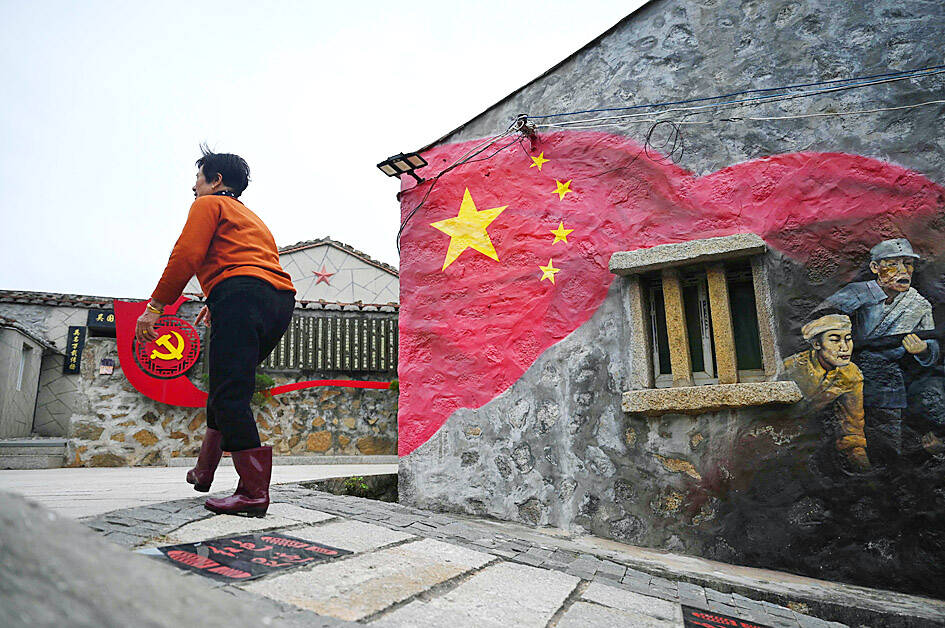Beijing is more likely to coerce Taiwan into unification rather than invade, against which the US should step up its deterrence, US academics said.
Instead of an invasion of Taiwan, China might launch a “short of war coercion campaign” focusing on “economic warfare accompanied by limited kinetic action,” American Enterprise Institute senior fellows Dan Blumenthal and Frederick Kagan said in an opinion piece published in The Hill on Monday.
“More attention to Taiwan’s security is welcome,” they said, while warning that “the current public discourse remains too focused” on the threat of a possible Chinese invasion of Taiwan.

Photo: AFP
For example, Beijing could escalate the hybrid warfare strategy it has been implementing, which “US policy is not well designed to deter or defeat,” they said.
Unifying Taiwan without “starting a full-scale and likely global war” means that China could reduce the risk of hurting its national power and the ambition to become the world’s leading power, they said.
The “deep domestic political divisions” and “a rise in skepticism of America’s support” reflected in the Taiwan’s presidential and legislative elections in January “creates an opening for China’s manipulation of Taiwan’s understandable fears of abandonment,” they said.
Beijing’s adoption of “gray zone” tactics in the South and East China seas and the Taiwan Strait has proved a “general success,” which makes it likely it would continue the strategy, they said.
A report published by the academics and other researchers on Monday showed that such a strategy is “realistic and highly dangerous,” Blumenthal and Kagan said.
The study modeled Chinese coercive actions during the four-year term of the incoming administration, including constant air and naval incursions, a quasi-blockade, political warfare and manipulation, extensive cyber and physical sabotage of Taiwan’s critical infrastructure, and deadly force on outlying islands.
The strategy would possibly break the US-Taiwan relationship, degrade Taipei’s ability to govern, and undermine the will of Taiwanese to resist and the US’ desire to aid Taiwan, they said.
The scenario would provide Beijing with a “peace offering” opportunity, where it promises Taipei a level of autonomy in exchange for cooperation, they said.
Blumenthal and Kagan called on the US and its allies to deter China by “clearly articulating Taiwan’s sovereign rights under international law” and rejecting Chinese attempts to treat Taiwanese affairs as “internal matters.”
Taipei and Washington should work together to “better prepare Taiwan to withstand blockades and blockade-like economic activities,” they said.
They also called for a US-led coalition to foster closer cooperation with Taiwan to make China pay for its military intimidation such as air incursions over the Taiwan Strait.
“By focusing on the means by which China is likely to intensify its coercion efforts, the US can overcome them,” they said.

The Coast Guard Administration (CGA) yesterday said it had deployed patrol vessels to expel a China Coast Guard ship and a Chinese fishing boat near Pratas Island (Dongsha Island, 東沙群島) in the South China Sea. The China Coast Guard vessel was 28 nautical miles (52km) northeast of Pratas at 6:15am on Thursday, approaching the island’s restricted waters, which extend 24 nautical miles from its shoreline, the CGA’s Dongsha-Nansha Branch said in a statement. The Tainan, a 2,000-tonne cutter, was deployed by the CGA to shadow the Chinese ship, which left the area at 2:39pm on Friday, the statement said. At 6:31pm on Friday,

The Chinese People’s Liberation Army Navy’s (PLAN) third aircraft carrier, the Fujian, would pose a steep challenge to Taiwan’s ability to defend itself against a full-scale invasion, a defense expert said yesterday. Institute of National Defense and Security Research analyst Chieh Chung (揭仲) made the comment hours after the PLAN confirmed the carrier recently passed through the Taiwan Strait to conduct “scientific research tests and training missions” in the South China Sea. China has two carriers in operation — the Liaoning and the Shandong — with the Fujian undergoing sea trials. Although the PLAN needs time to train the Fujian’s air wing and

STRIKE: Some travel agencies in Taiwan said that they were aware of the situation in South Korea, and that group tours to the country were proceeding as planned A planned strike by airport personnel in South Korea has not affected group tours to the country from Taiwan, travel agencies said yesterday. They added that they were closely monitoring the situation. Personnel at 15 airports, including Seoul’s Incheon and Gimpo airports, are to go on strike. They announced at a news conference on Tuesday that the strike would begin on Friday next week and continue until the Mid-Autumn Festival next month. Some travel agencies in Taiwan, including Cola Tour, Lion Travel, SET Tour and ezTravel, said that they were aware of the situation in South Korea, and that group

Taiwanese celebrities Hank Chen (陳漢典) and Lulu Huang (黃路梓茵) announced yesterday that they are planning to marry. Huang announced and posted photos of their engagement to her social media pages yesterday morning, joking that the pair were not just doing marketing for a new show, but “really getting married.” “We’ve decided to spend all of our future happy and hilarious moments together,” she wrote. The announcement, which was later confirmed by the talent agency they share, appeared to come as a surprise even to those around them, with veteran TV host Jacky Wu (吳宗憲) saying he was “totally taken aback” by the news. Huang,